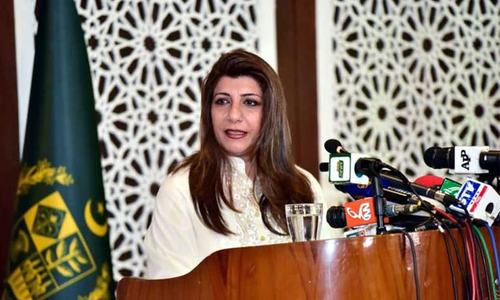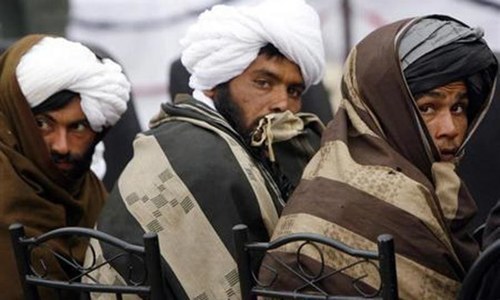THE results of the 2019 Afghan presidential elections have further complicated the prospects for achieving intra-Afghan political reconciliation. They have pushed down the hope that the newly elected regime would be able to form an inclusive team to talk to the Afghan Taliban. While the election authorities have declared the incumbent president Ashraf Ghani as the winner, runner-up Dr Abdullah Abdullah has not only rejected the results but also announced he will form his own parallel government.
Read: A long way to Afghan peace
The persisting political turmoil in Kabul has increased just a week before the announcement of a deal is expected between the US negotiation team and the Taliban. Many anticipate that the much-awaited deal will bring to the fore the crucial process of nation-building in a war-torn country, where all Afghan stakeholders will not only have to build consensus on a permanent, comprehensive ceasefire, but also reconstruct a new social contract for their country. However, the deepening political crisis in Afghanistan can slacken the peace process, causing a delay in the announcement of the deal. It will increase frustration among the external stakeholders and facilitators (mainly the US) who want to end the decades-old conflict, which is consuming their financial resources and political capital.
The Afghan Taliban deputy and Haqqani Network chief Sirajuddin Haqqani hinted at the Taliban’s internal difference over the peace process in an opinion piece published in The New York Times. However, their differences are not as severe as the trust deficit among their opponents including Afghan and international stakeholders. Political chaos in Kabul is an advantage for the Taliban, which they will use to bolster their bargaining position while dealing with the US and fellow Afghan stakeholders. It is not yet certain how Washington will respond to the simmering controversy over election results.
For Pakistan, this is a delicate situation as it has played a critical role in facilitating US-Taliban talks, hoping that the process would help reduce pressure from its western border. Facilitating the peace process was also essential for Pakistan to put its economy back on the road including through earning the confidence of Washington and European capitals. However, protracted political turmoil in Afghanistan could shatter many of Pakistan’s hopes.
In the current environment, what are the options left for Pakistan?
Even if US intervention resolves election-related controversies, building consensus for a broad-based negotiation team will be an uphill task. The formation phase of the negotiation team may take longer than expected, as it is also not clear whether or not it will be conditioned on the US troops’ withdrawal. However, a prolonged process could increase internal pressure on the Taliban leadership to adopt an alternative approach and declare their parallel government, or emirate, which is already functioning in the peripheries and rural areas of the country. In such a situation, much of the pressure will be put on Pakistan both by the international community and the factionalised political Afghan elite.
A couple of years earlier, a scenario-building exercise was carried out to get a picture of Pak-Afghan bilateral ties in 2030. One scenario was that if foreign troops left Afghanistan without accomplishing their mission, the Afghan power elites and Taliban would not be able to bring stability to the country. In that case, Afghanistan’s immediate neighbours would have little leverage over Afghan stakeholders to force them to build consensus.
Bilateral relations between Afghanistan and Pakistan would further deteriorate, thus increasing the animosity between the two nations to India’s advantage. It would be a nightmare for Pakistan as it would increase border tensions and insecurity, and negatively impact trade and people-to-people contact between the two nations. The nightmare for the international community mainly the US, China and Russia would be that the Taliban’s power would grow and international terrorist groups become influential. In such a scenario, China and Russia would prefer to put their weight behind the most definite contender(s) of power.
That was a pessimistic scenario and indicated that the political compulsions had become so strong that imagining a scenario where the Afghans as a state and society could overcome their differences was difficult.
In the current environment, what are the options left for Pakistan? Complete detachment from the emerging situation in Afghanistan is one option. This can be interpreted as maintaining a neutral position before and during the complicated process of intra-Afghan talks. This would be an ideal but awkward position because of complications that could emerge during the withdrawal of foreign forces and the dialogue process. The US would have to rely on Pakistan to use its influence over the Taliban and a few other political actors in Afghanistan.
Secondly, there is no guarantee that Russia, Iran, and particularly India, would maintain a neutral position. India and Iran have their proxies and favourites in Afghanistan, whom they will not abandon. Pakistan will be an easy target of such ‘favourites’ if the dialogue is deadlocked. Pakistan will have to maintain and further diversify its relations with Afghan stakeholders other than the Taliban.
If the exit process is caught in complications, the US can review its approach. But for the global community, the most critical aspect would be long-term economic assistance pledges to help Afghan power elites develop viable economic growth structures. This factor will also dominate the intra-Afghan dialogue. It remains to be seen how Afghan stakeholders, who have divergent interests, will deal with this challenge. It is expected they will build pressure on Pakistan regarding the transit trade agreement and could demand easy access to ports. If Pakistan-India relations remain tense, it would not be easy for Pakistan to make any concession.
The processes of withdrawal and dialogue will be lengthy with all their complexities, but their completion will see the real test for Pak-Afghan ties. Pakistan should have a blueprint for the future and prepare the ground for a long-term strategic and economic cooperation treaty with Afghanistan. This is important in order for both countries to emerge from the Indian-centric strategic hangover and develop their independent bilateral relationship.
The writer is a security analyst.
Published in Dawn, February 23rd, 2020














































